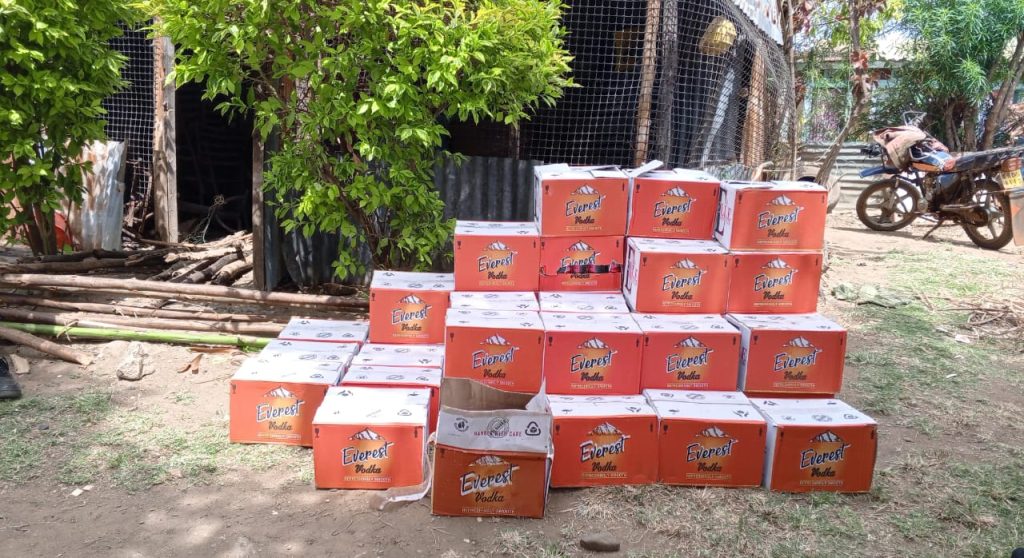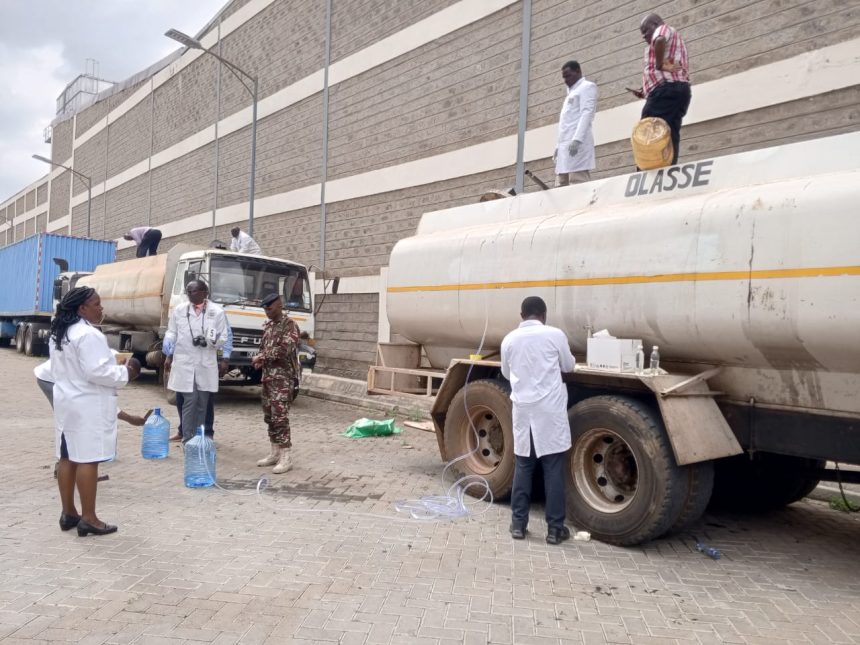A multimillion-shilling illegal liquor distillery and several tonnes of alcoholic drinks and smuggled ethanol have been seized in an ongoing crackdown to disrupt a complex network of individuals involved in tax evasion schemes in the liquor trade, the Kenya Revenue Authority has reported.
The tax authority disclosed on Monday that three illegally established alcohol distilleries, 1,000 cartons of counterfeit and second-generation alcohol brands, 56,000 litres of ethanol, and 60,000 counterfeit excise stamps have been impounded in various parts of the country during ongoing tax evasion investigations.
One of the illegal liquor manufacturing plants was discovered operating within a private residential compound in the Marurui area of Kasarani Sub-County in Nairobi. Equipment worth KSh 14 million, ethanol valued at KSh 2 million, alcoholic products worth KSh 5.7 million, and 23,000 counterfeit excise stamps were seized from the house. The owner has been arraigned before the Milimani Chief Magistrate on charges of violating the provisions of the Excise Duty Act.
“The discovery happened few days after a successful intelligence-led operation in which 40,971 litres of smuggled ethanol valued at KShs. 26.9 million concealed as imported molasses were tracked and seized in Limuru. This was one of the largest single consignment of smuggled ethanol to be intercepted in the recent past. Through the interception, tax loss of over KShs. 20.5 million was averted,” said KRA’s commissioner of investigations and enforcement
Weeks later, the commisioner says 7,500 litres of ethanol worth KShs. 4 million were intercepted at Lwakhakha border in Bungoma County while concealed inside maize bags. Last year, a total of 60,000 litres of ethanol were seized. Among the seized alcohol is 633 cartons that were seized in Kacheliba, Cherangany Constituency in Trans Nzoia County while on transit, 120 cartons seized in Bureti Subcounty in Kericho whereas 100 cartons were seized at a residential house in Sultan Hamud Trading Centre in Makueni County.
Another operation in Oljororok, Nyandarua West Sub County also led to discovery of an illegal liquor depot in a residential compound where 109 cartons of assorted alcohol brands, 27 jerricans of ethanol and 36,000 pieces of counterfeit excise stamps were seized. Additionally, 60 sacks of bottle caps were seized at Industrial Area in Nakuru. A total of ten suspects were arrested during these operations currently facing tax fraud charges in various courts across the country.

The domestic excise goods trade sector accounts for about six per cent of the ordinary revenue collections in excise taxes, making it a critical revenue mobilization sector. During the last financial year (FY 2023/24), it accounted for KShs. 73.624 billion out of total revenue collection of KShs. 2.407 Trillion. This sector comprises of manufacturers of alcoholic drinks, soft drinks, bottled Water, and Tobacco. In FY 2022/23, KShs. 68.1 billion was realized while KShs.66.2 was collected in FY 2021/22.
A trend has been noted where most of the illicit liquor distilling plants are operated from private residential premises in posh estates to avoid detection by the law enforcement agencies. The illegal business is intricately linked to ethanol smuggling and extends widely to retailers and distributors of the end products, mostly the second generation alcohol brands.
“Kenya Revenue Authority (KRA) enforcement officers with the assistance of other law enforcement agencies have made significant progress in dismantling the network involved in elaborate tax evasion schemes linked to smuggling of as ethanol, illegal distilleries, packaging and production of counterfeit excise stamps used in the second generation alcoholic brands as well as distributors of the products,” said the Commissioner in a press statement
He said ethanol smuggled into Kenya for example avoids payment of excise and Value Added Taxes (VAT). When smuggled ethanol sold at a cheaper price to unlicensed manufacturers of counterfeited alcohol and second-generation liquor, it causes competitive business disadvantages to genuine manufactures due to the pricing distortions caused by smuggling, leading to economic losses and market instability. This illicit trade poses a considerable risk to revenue collection and national security, challenging both the economy and public health





